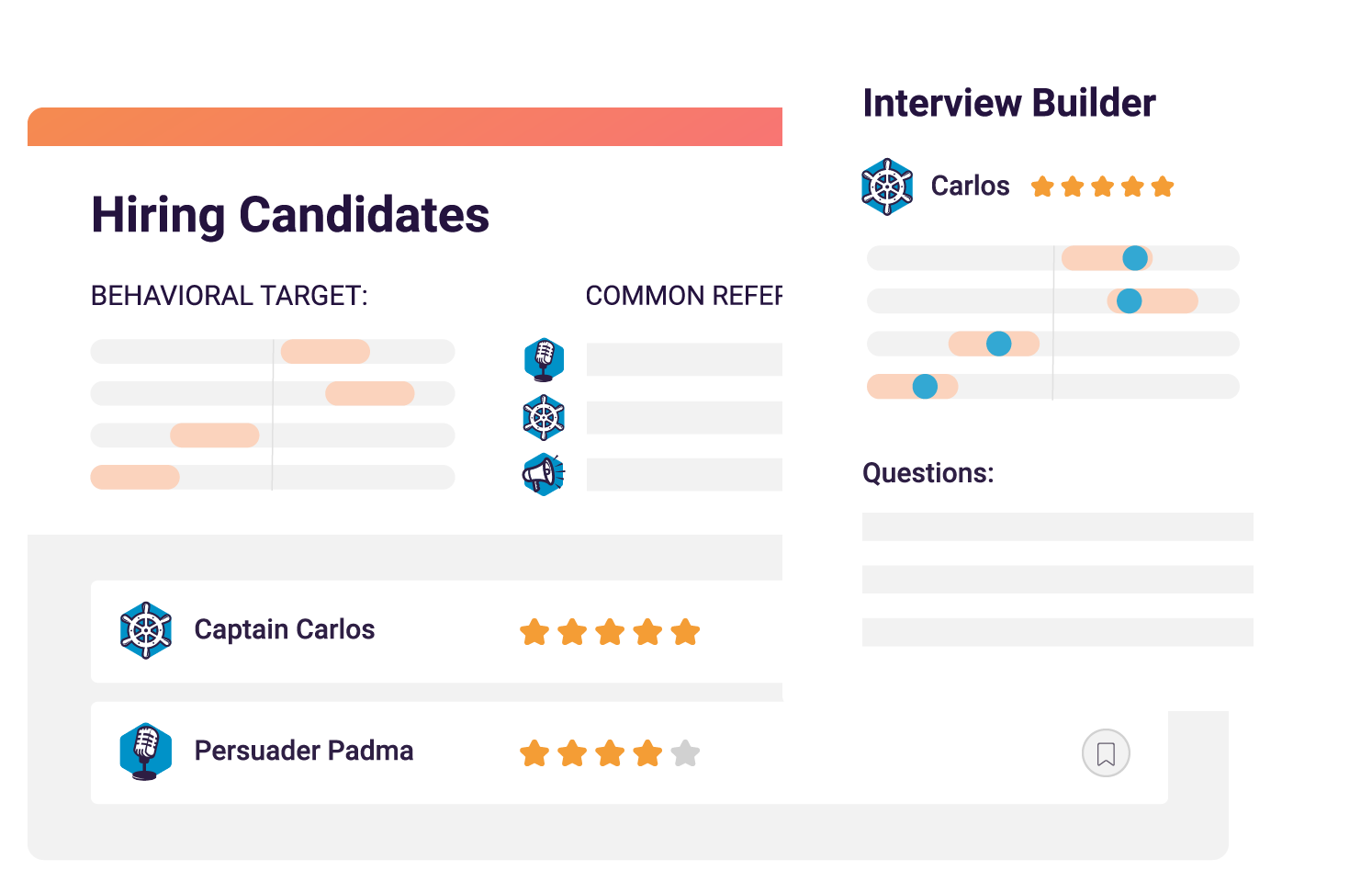Pre-employment testing is a method of collecting objective candidate data at the start of the hiring process. As an employer, you can use pre-employment tests to gauge the strength of job applicants before committing to a phone screen or interview.
Since pre-employment testing is repeatable and scalable, it can save you or your HR team a lot of time and headache. Perhaps more importantly, candidates that go through pre-employment testing tend to experience higher engagement levels and, in turn, greater productivity.
So it’s no surprise popularity for assessment tools has exploded in recent years. According to the Talent Board’s 2018 Candidate Experience Research report, 71% of companies use pre-hiring assessments as part of their process. Given the prevalence of these tools, It’s important to understand how to use them properly and responsibly.
In this blog post, we’ll cover:
- What are the different types of pre-employment tests?
- Why do employers use pre-employment assessments?
- What are employers looking for in personality assessments?
- What are the benefits to offering pre-employment tests?
- Likewise, what are the disadvantages to using pre-employment tests?
Let’s explore each of these topics in greater detail.

Other resources that might interest you:
- 6 Advantages of Using Personality Tests in the Hiring Process
- How to Establish a Consistent and Reliable Hiring Process
- How to Create the Ideal Candidate Profile
- How to Hire Employees Who Complement Your Strengths
What are the different types of pre-employment tests?
The world of testing is broad, and hiring is complex. Most pre-employment tools gather data on a single aspect of a candidate’s background, rather than tackling everything at once. Like tools in a workshop, you want to make sure you’re using the right test for the right need.
When selecting potential pre-employment tests, here are the major types to keep in mind:
Personality tests
Personality tests are among the most popular and well-known types of pre-hire assessments. First created in World War I to measure neurological stress in soldiers, these tests were eventually adapted for civilian use. Nowadays, you can encounter personality tests everywhere from the therapist’s office to a friendly team-building session.
Most personality tests measure a set of core behavioral factors. How you respond to questions determines where you fall for each of these factors. At the end of the assessment, you’ll typically receive a summary of these factors, along with your overall personality type.
Common examples of personality tests include:
- DiSC
- Hogan Personality Inventory
- Myers-Briggs Type Indicator (MBTI)
- The Predictive Index Behavioral Assessment™
Where these assessments tend to differ drastically is in their validity, particularly for workplace use. Despite the popularity of DiSC and MBTI, they face scrutiny for their lack of scientific rigor. These tests can help you better understand yourself, but serve mainly to spur conversation—not make hiring decisions. Both DiSC and MBTI include disclaimers on their websites dissuading HR professionals from using their assessments for pre-hire selection.
Tools like Hogan and the PI Behavioral Assessment™ are designed specifically with talent acquisition in mind. In the case of PI, the assessment is backed by 60 years of science, including 400+ studies proving its validity and reliability. PI also helps recruiters comply with the Equal Employment Opportunity Commission (EEOC), supporting a pre-hire process that’s both reliable and fair.
Aptitude tests
An aptitude test assesses various facets of intelligence. These tests can take many forms, depending on the needs of the role, but the common areas of focus include:
- Diagrammatic reasoning: Solving diagram-based problems
- Logical reasoning: Deducing answers based on logical patterns
- Numerical reasoning: Reading and analyzing data sets and figures
- Situational judgement: Making decisions about work-based scenarios
- Verbal reasoning: Extracting meaning from written passages
Hiring managers may choose to incorporate some, or all, of these areas into their aptitude testing. For example, the consulting industry frequently requires candidates to complete a case study interview. This case study may involve interpreting data, deductive reasoning, and making decisions based on work-like scenarios.
Integrity tests
Integrity tests aim to gauge a candidate’s ethical and moral compass. Recruiters tend to use these tests to determine fit for jobs where honesty and trustworthiness are especially critical. For example, if you’re hiring a jewelry salesperson or bank teller, an integrity test may help protect you against internal theft.
Other common use cases for integrity tests include:
- Data security analysts
- Financial advisors
- Healthcare workers
- Security guards
- Teachers
Cognitive ability tests
Cognitive ability refers to one’s capacity to acquire, process, and apply new information. If you’ve ever taken the SATs, you might be familiar with the concept. Unlike the SATs, however, cognitive assessments aren’t something you study or prepare for.
Cognitive assessments present job candidates with a variety of questions, from logic puzzles to shape recognition. These questions gauge critical reasoning and spontaneous problem-solving. These assessments also tend to be timed, requiring both speed and accuracy to complete.
Of all the candidate data available to recruiters, cognitive ability is widely considered the No. 1 predictor of job performance. A cognitive tool such as the PI Cognitive Assessment™, then, can be a critical asset for pre-hire selection.
However, powerful data bears immense responsibility. As a recruiter, over-relying on cognitive testing runs the risk of adverse impact—the act of discriminating against a protected group, even if unintentionally. If you decide to screen out candidates that fail to hit a certain cognitive benchmark, you may disproportionately impact minorities that lack the same quality of education as their peers.
Cognitive ability is an incredibly powerful data point, but it’s just that: one data point. Pair it with other pre-employment assessments—e.g., a behavioral assessment, integrity test, etc.—to promote a healthier, more inclusive hiring process.
Skills tests
Where behavioral and cognitive assessments explore parts of a candidate that are relatively innate (i.e., the “head”), a skills assessment gets at one’s learned experience, or “briefcase”.
A resume can serve as a helpful window into a candidate’s experience. But when looking to truly assess that briefcase—both hard skills and soft ones—here’s how to dive a level deeper:
Hard skills
Hard skills refer to the technical competencies needed to thrive in a given role. These job skills become particularly relevant for specialized positions, especially at the manager level or above.
For example, if you’re hiring a marketing specialist, the hard skills needed may include:
- Copywriting
- SEO knowledge
- Graphic design
- PPC advertising expertise
Likewise, if you’re hiring a product engineer, you may look for knowledge of particular programming languages, frameworks, and APIs.
One way to probe for hard skills is to facilitate a job knowledge test. For the marketing specialist role, you could have candidates create a presentation sharing how they’d improve part of your team’s marketing funnel. For the engineer role, you could have them tackle a programming exercise in one of the coding languages your team uses.
Soft skills
Soft skills encompass all non-technical skills you may look for in a candidate. These skills tend to be useful regardless of department or team, and include:
- Attention to detail
- Collaboration
- Conscientiousness
- Decision-making
- Empathy
- Leadership
- Listening ability
The job interview process can be a great opportunity to probe for these traits. Use behavioral interviews to understand how a candidate likes to communicate, lead, and make decisions. Also consider conducting a culture interview, in which you can gauge how well the candidate aligns with your organizational values.
Physical ability tests
Physical ability tests apply to jobs that require heavy manual labor or dexterity (e.g., a firefighter, construction worker, etc.). Like aptitude tests, physical ability tests vary by function, and include:
- Balance tests: Gauges ability to maintain body stability
- Cardiovascular endurance tests: Assesses ability to walk, climb, or run for extended periods
- Flexibility tests: Tests ability to bend, twist, or stretch the body
- Muscular tests: Gauges ability to move/lift objects or use certain tools
As with cognitive ability, physical ability tests run the risk of adverse impact if used improperly. If your job description requires the ability to lift, say, 80lbs, that could disproportionately eliminate women from your pipeline. As a hiring team, always be realistic about what’s a “need to have” and what’s simply “nice to have” (OSHA, for instance, recommends no more than 50 lbs).

Why do employers use pre-employment assessments?
Employers use pre-employment assessments to compile as many selection criteria, or “data points,” about a candidate as they can. From cognitive ability to behavioral profile, these data points all have some ability to predict job performance.
Many of these data points only have small correlations with each other, meaning there’s relatively little overlap among job predictors. As an employer, the more criteria you collect, the more informed you become about your candidate pool. Thus, the higher the likelihood of finding the best candidate for the role.
What are employers looking for in personality assessments?
Personality tests are especially popular among pre-employment assessments. They’re relatively low-risk—meaning they’re fair—and they wield strong predictive power when combined with more traditional criteria like resumes and interviews.
When an employer develops a job description, they often seek specific behaviors or characteristics (e.g., verbal communication, ability to motivate others, attention to detail) in addition to experience and skill set. Personality traits are widely considered a good predictor of behavior, so when applied to the workplace, they can also help predict job-related behaviors, such as communication or decision making.
Resumes and interviews can give you some indication of workplace behaviors. Unlike resumes, however, personality assessments are generally considered better predictors of behavior. And while interviews can be resource-intensive, personality assessments tend to be low-cost and scalable. As an employer, it’s hard to pass on those qualities.
How do you pass an assessment test?
This is a popular question among job candidates—and also one that’s rife with misinformation.
For employers, pre-employment screening should serve to set candidates up for success. By collecting a wide variety of “people data,” recruiters can identify employees that are natural fits for the open position—a beneficial outcome for the employer and candidate alike. Many applicants, however, view pre-employment screening as something to overcome. And this often stems from employers failing to use candidate data responsibly.
Take personality data. Employers must understand that candidates can still be a good fit, even if their personality test results don’t match all of the desired behaviors. Candidates deserve to find a role they’ll thrive in, and employers deserve to hire someone who will fit and perform well in the role. With this mindset, there’d be no expectation to “pass” a personality assessment.
Unfortunately, many employers don’t follow that mindset, instead using personality assessments to screen candidates out early on in the process, without ever meeting or interviewing them. For that reason, there’s a perception that a personality assessment is something to be passed.
There’s a huge body of research on response distortion, or “faking” personality tests. Ultimately, however, research has indicated that less than 4% of applicants fake these assessments.
How do you prepare for a personality test?
Candidates should not be concerned with “passing” a personality test. Instead, they should answer honestly, in a way that reflects how they tend to behave at work.
It’s true that personality can change in certain contexts. For example, people can display a high extraversion drive in certain environments or situations, even if they’re naturally more introverted. But in most cases, personality is relatively stable over time.
For this reason, trying to “pass” a personality test would only set a candidate up for failure. They could get the job, only to find a few weeks in that they’re not a great fit. Imagine a naturally introverted person taking on a sales job that requires them to cold call 100 prospects a day.
Instead, candidates should answer personality tests honestly, in a way that reflects how they actually behave at work. There’s absolutely no prep needed for a personality assessment. It’s not a test. Employers generally just want to understand how you’d naturally behave in a role, and which behavioral traits you’d have to “stretch” if you were hired.
When candidates answer truthfully, they’re more likely to find a role that plays to their strengths, and won’t have to change their personality to fit the role. Likewise, employers will be able to find a candidate that’s more likely to succeed and perform on the job. It’s a win-win for all involved.
What are the benefits to offering pre-employment tests?
In the right hands, pre-employment tests are powerful tools that can take your selection procedures to the next level. In terms of benefits, these tests tend to:
- Provide additional data points about your candidate.
- Encourage a holistic, well-rounded selection process.
- Be easy to administer; they don’t require a lot of time, money, or effort.
- Be quick for the candidate to complete.
- Provide information that can also be useful after a candidate is hired.
- Be flexible—you can administer them earlier or later on in the hiring process.
- Predict workplace behavior (depending on the personality assessment).
Extra emphasis on in the right hands. When used properly, pre-employment tests give you the tools to assess the “whole” candidate—head, heart, and briefcase. It’s only when employers ignore this mentality that the drawbacks begin to show.
What are the disadvantages to using pre-employment tests?
For one, pre-employment tests are often used incorrectly. Many employers don’t realize that tools like personality assessments are just one data point in a candidate’s application. These tests should never be the sole reason a candidate gets ruled out.
Candidates can also react negatively to personality assessments. Say a qualified candidate completes an application and accompanying personality assessment, only to get rejected. That candidate will likely assume they didn’t answer the personality assessment the “right” way. This is only exacerbated if the employer automatically screens out certain personalities—a practice that isn’t recommended.
Moreover, sometimes employers don’t articulate the why behind a personality assessment upfront. Candidates may question why the assessment is relevant to the job, which can create confusion and negative sentiment early. Experiences like these don’t just impact your employer brand—they also make for a poor candidate experience.
That’s why it’s important to use assessment tools thoughtfully. You can’t and shouldn’t select candidates based on a single data point. Consider screening resumes, holding interviews, and assessing a variety of factors, including personality and cognitive ability. Doing so will help you improve the candidate experience, mitigate risk when hiring, and set new hires up for success.
PI is far more than a pre-hire assessment.
By adding the PI Behavioral and Cognitive Assessments to your pre-employment process, you can cut down on bad hires and land great talent. But that only scratches the surface.
PI’s talent optimization platform goes far beyond hiring. Use PI with your current employees, and give them the gift of enhanced self-awareness. Strengthen communication, build trust, and improve retention. Understand your strengths and caution areas as a team, so you can tackle any challenge—with confidence.
Learn more about PI. Request a demo:
Request a Demo
9,000+ companies trust The Predictive Index to create dream teams.
See how PI’s Talent Optimization Platform can help your company hire with certainty, inspire your teams, and sustain lasting employee engagement.








